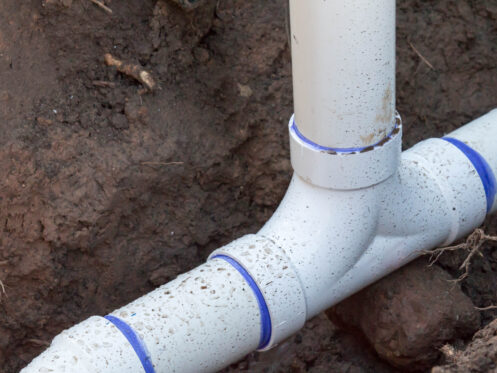Your home’s plumbing is a modern convenience largely hidden within cabinetry, underneath the property and behind walls. Most people only know the age of their pipes by comparing them to the property’s construction date. Take a deeper dive into your plumbing’s life span and what to expect as it ages.
Know Your Plumbing’s Material Type
Although the plumbing industry has certain standards, every home can have a mixture of different pipe materials. Certainly, the materials vary based on the home’s age and its location as well as the pipe’s particular application. For example, copper pipes are commonplace and offer about 50 years of reliable service.
In contrast, galvanized steel pipes have a shorter life span of 20 to 50 years. For other materials, such as brass or PVC, you can expect about 40 to 70 years of service. Ultimately, these age estimations can vary based on wear, maintenance schedules, and other factors.
Compare Supply vs. Drainage Pipes
Your home uses a combination of different pipe materials based on the plumbing’s application. Water entering the home, such as that from faucets, runs through supply lines. Because these pipes are constantly under pressure from municipal sources, they might age faster than drainage lines. Luckily, metal piping is standard for supply lines, which leads to a long and reliable life span.
In contrast, drainage lines are merely conduits for gray and sewer water. The water pressure is significantly lower than that in supply lines. For this reason, a combination of plastic or metal pipes supports this plumbing with a long life span, too.
Look at Mineral Content
Your water’s hardness also directly impacts your home’s plumbing. Although safe to drink and bathe in, hard water has minerals that can build up within your pipes. Consisting largely of magnesium and calcium, these minerals slowly attach to your plumbing, which can lead to clogs.
Because the mineral buildup negatively influences the plumbing’s water pressure, the pipes can experience some deterioration over time. As a solution, you might consider a water softener for the property. By removing most of the minerals from your water, the water softener enhances your plumbing’s life span.
Examine Your Home’s Age
In the past, lead piping was the plumbing solution because this material can last for 100 years. However, lead was banned as a material used for plumbing by 1986. Truthfully, many homes today may still have lead pipes. Lead is known to cause various health problems, so evaluating your home for any exposure is critical.
If your home was built before 1986, lead pipes might be part of its infrastructure. Today, plumbing professionals can identify and replace lead pipes. Working with experienced professionals can make a repiping project safe and within your budget.
Observe Water Color
Aging pipes can show their true colors through water discoloration. For example, brown or yellow water might indicate rust in the system. If you notice cloudy water, this discoloration might stem from minerals or sediment in the plumbing. Although rare, green-tinted water can occur, too.
Ideally, a plumbing professional must evaluate your pipes when discoloration becomes the norm in your home. Temporary cloudiness is often an issue on the municipal side of your water supply. Long-term water discoloration translates to issues with your plumbing. Undoubtedly, water discoloration can be subtle at first, so it’s important to actively observe your water supply and contact the professionals as needed.
Evaluate Your Entire Property for Any Plumbing Clues
If your plumbing is several decades old, scheduling an appointment for a property evaluation can save you money in the long term. For instance, plumbing professionals can start with an interior inspection. Yellow stains on walls or ceilings are clues that might help locate a potential plumbing leak. Moisture seeping through the walls is obviously another sign.
Also, your front yard might reflect signs of aging plumbing. Mysterious puddles on the lawn, for example, may not be from a recent rainstorm. Plumbing underneath the yard can leak, which leads to water pooling on the lawn’s surface. Any of these scenarios call for a plumbing repair service so that further water damage doesn’t occur.
Your Local Plumbing Resource
TYCO Plumbing is your dedicated plumber in Brighton, CO. Along with pipe inspections, we can perform leak detection, water heater repairs, sewer line repairs, and a full spectrum of plumbing tasks. From sump pump service to water softener installation, our Colorado team supports your property’s plumbing needs year-round. Contact us at TYCO Plumbing for an evaluation today!



